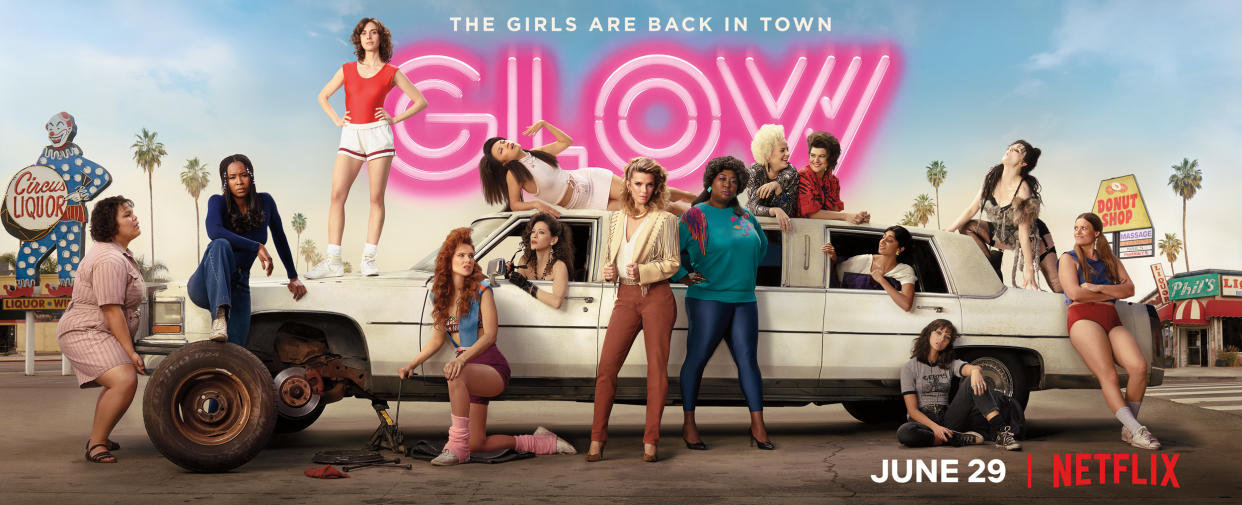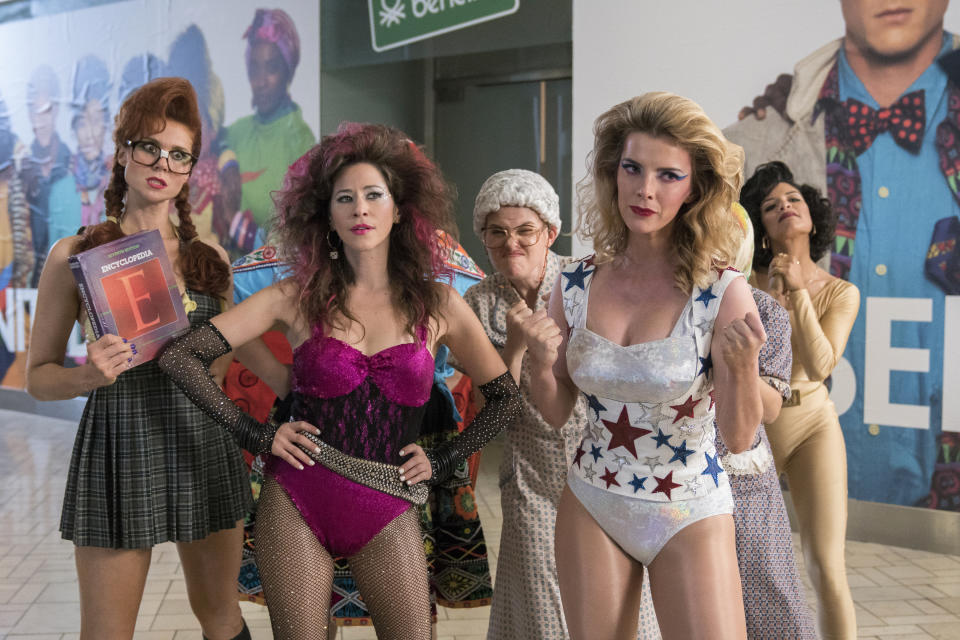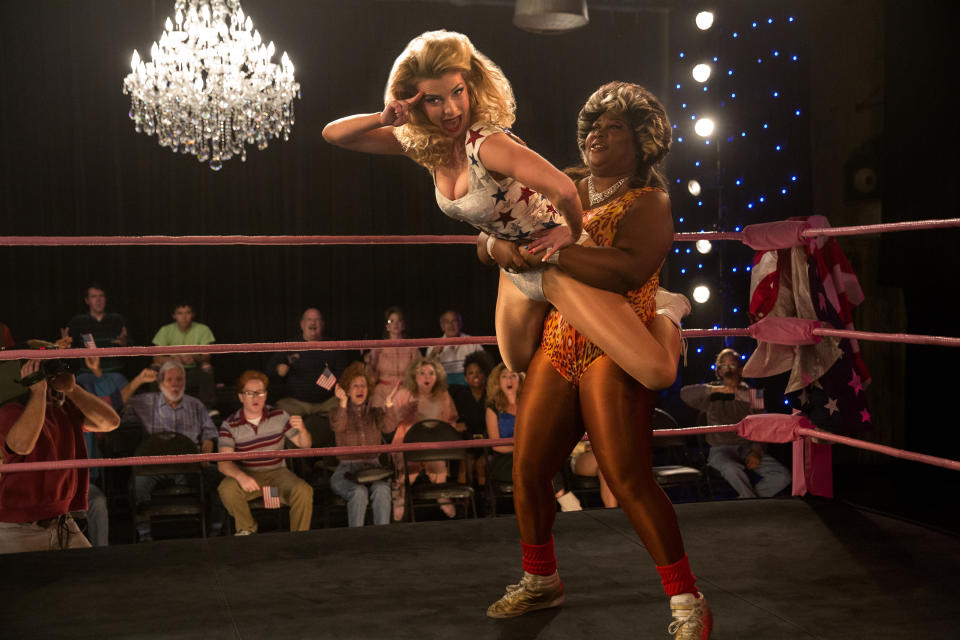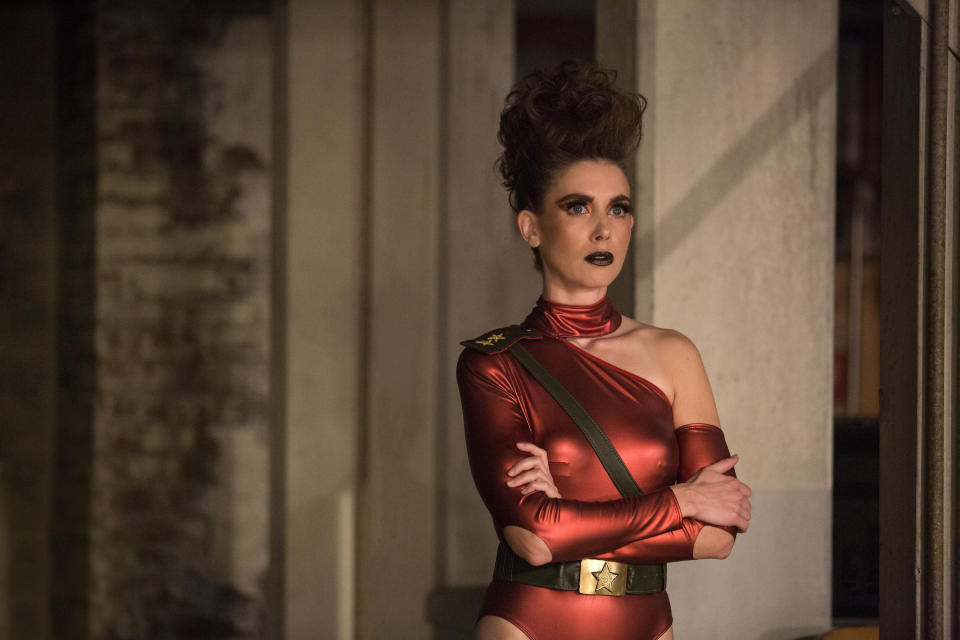GLOW: Looking ahead to season 2

Wrestling comedy-drama GLOW returns to Netflix for a hotly anticipated second season on the 29th June. While the first season received plenty of critical acclaim upon release, the show arguably hasn’t yet reached the upper echelons of Netflix favourites. With any luck however, a strong second season could change all that as more and more viewers get lured in by the show’s colourful and chaotic story.
For the uninitiated, GLOW revolves around a determined and eclectic group of women who come together to star in an all-female pro-wrestling show in 1985 Los Angeles. Loosely based on the exploits of the real-life “Gorgeous Ladies of Wrestling”, the show focuses not only on progress of the wrestling promotion itself, but also the complicated personal lives of the ladies and their world weary director, Sam.
Season 1 recap

Season 1 of GLOW revolved primarily around both the initial fight to get the show greenlit and the rivalry between Alison Brie’s flawed but well-meaning Ruth and Betty Gilpin’s former soap star, Debbie. Their intense falling out was caused by Ruth sleeping with Debbie’s husband, a move which leads to plenty of in-ring tension as the pair become the fledgling promotion’s central villain and babyface.
The GLOW roster is rounded out by a lovable band of misfits including Cherry Bang (Sydelle Noel) a former stuntwoman who becomes the girls’ reluctant trainer, Carmen (Britney Young) a heavy-set young woman whose proud wrestling family don’t want her to enter the family trade, and Melanie (Jackie Tohn) a wild party girl with a chip on her shoulder.
At the helm meanwhile is Sam, played with wonderful grouchiness by comedian Marc Maron. Sam is a down on his luck director who made his name with some moderately popular exploitation movies in the 1970s. Battling a drug addiction and an aversion to any meaningful relationship, this unlikely leader is tasked with putting a show together under the inexperienced eye of Chris Lowell’s spoiled rich-boy producer, Bash. Against the odds, the group finally make a pilot episode which proves so successful, they then get asked to make an entire series.
Season 2

Season 2 will pick up right where the first season left off. We’ll join the GLOW ladies basking in their recent success and looking forward to making their show. Naturally though, things don’t go smoothly and professional and personal struggles swiftly start to get in the way. The most pressing of which is the decision by TV executives to move their new show to a disastrous 2am time slot.
Sexual politics and female empowerment have always been at GLOW’s centre, but these issues will be pushed even further to the fore in the second season. This time out, the ladies will have to deal with seedy TV executives making inappropriate advances, forcing them to fight their corner in more ways than one.
The personal lives of the women will once again provide much of the drama aspect of this comedy-drama. Ruth and Debbie’s tense detente will inevitably be tested once more with Debbie herself facing a huge personal upheaval. She’s going through a divorce, a career downturn and must also cope with the pressures of motherhood. We’ll also get a look at the private life of Kia Stevens’ Tamme, whose own experiences as a mother are intertwined and contrasted with Debbie’s, while the inherent racism of her “Welfare Queen” character is also addressed.
Sam’s attempt to connect with his newfound daughter Justine (Britt Baron) will also be a major part of his season arc, the grouchy no-nonsense curmudgeon no doubt struggling with this newfound degree of responsibility.
One thing that will be noticeably different this season however is that there will be far more actual wrestling involved. While season 1 was primarily about the ladies learning the basics and fighting to get the show up and running, this season will see them actually making a TV show, providing us with a glimpse behind the pro-wrestling curtain. The first season was commended for its portrayal of wrestling, never outright mocking or patronising the profession, instead choosing to emphasise its physical demands and embrace its inherently over-the-top nature. Season 2 looks set to continue this trend and focus on the positives of this oft maligned profession.
Strengths

Like several other popular Netflix originals, such as Orange is the New Black or Dear White People, GLOW is billed as a comedy-drama. While it definitely falls slightly more in the comedy camp than drama, it still excels at both genres. Funny and upbeat, the show pokes playful fun at pro-wrestling, as well as at the band of misfits turning their hand to it. At the same time however, GLOW also ensures you are invested in their personal lives and doesn’t shy away from the harder themes this may involve.
Their wrestling career is shown as being both a fun job for these women, but also a cathartic release. It’s a way to escape the drudgery of their lives in a world still riddled with sexisim, racism and inequality. The 80s period setting is of course perfectly rendered, from the hairstyles and soundtrack, right down to the sexual politics. However, the message of female empowerment and unity is a timely one. While the gender issues addressed are set some thirty odd years ago in the past, they remain as relevant as ever.
GLOW also benefits from not only have strong leads in Alison Brie, Betty Gilpin and Marc Maron, but also a superb ensemble cast who all bring their own special something to proceedings. Whether its She-Wolf (Gayle Rankin) an outsider with uncanny commitment to her character, or Justine (Britt Baron) the punk rocker on a mission, they feel fully fleshed out as characters, which only makes us root for them more. The fact that this diverse group of women all form such a close bond is a huge part of what gives GLOW such a heart-warming sense of unity and inclusivity.
GLOW returns to Netflix on June 29th for another ten episode run.
Read More:
10 best Netflix Original Series so far
The best comedy shows returning to Netflix in 2018
Disenchantment: Netflix’s next big animated comedy hit?

 Yahoo Movies
Yahoo Movies 
